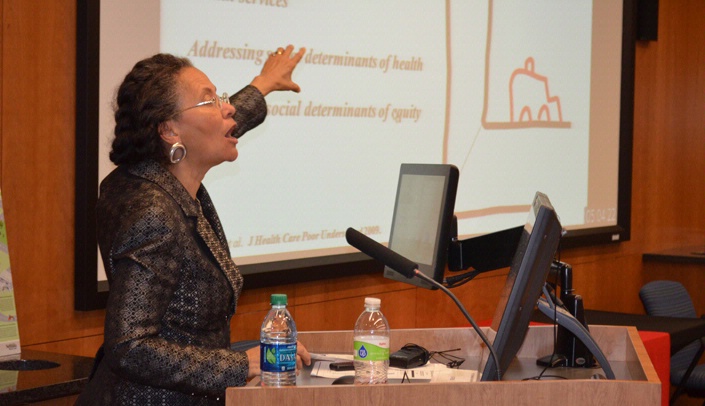Racism.
What is it, how to identify it and what can be done about it.
The highly charged topic of racism was addressed in a presentation by Camara Phyllis Jones, M.D., Ph.D., president of the American Public Health Association (APHA) and well-known educator on the impacts of racism on health, at the annual APHA Region VII conference at UNMC on April 27.
More from Dr. Jones
- Addressing the Social Determinants of Children’s Health: A Cliff Analogy
- Confronting Institutionalized Racism
- Levels of Racism: a Theoretic Framework and a Gardener’s Tale
- Systems of Power, Axes of Inequity: Parallels, Intersections, Braiding the Strands
- Achieving Health Equity: Tools for a National Campaign Against Racism
- <a href="TEDxEmory, Allegories on Race and Racism
- APHA Racism & Health Website
“Achieving Health Equity: Tools for a National Campaign against Racism” was the title of Dr. Camara’s powerful speech at the conference, hosted by the Public Health Association of Nebraska (PHAN) and held in a packed auditorium in the College of Public Health.
As APHA president, she initiated a national campaign against racism and has added health equity to the organization’s values. Dr. Jones also is a senior fellow at the Satcher Health Leadership Institute and the Cardiovascular Research Institute, Morehouse School of Medicine.
“I know I can’t eradicate racism in my one year as president, but this is a good start,” she said.
Dr. Jones used allegories to illustrate racism on three different levels and describe its impacts on individual and community health. She also presented strategies for eliminating racism at UNMC and in everyday life.
“First, you have to identify it. See it for what it is,” she said. “Racism is a system of structuring opportunity and assigning value based on the social interpretation of how one looks that saps the strength of the whole society through the waste of human resources and genius. You need to understand the initial insult in history before you can move forward.”
She outlined three levels of racism — institutionalized, personally-mediated, and internalized — of which we are all victims and perpetrators, regardless of whether or not we realize it.
“It is difficult for any of us to recognize a system of inequity that privileges us,” Dr. Jones said. “It is difficult for men to recognize male privilege and sexism. It is difficult for white people in this country to recognize white privilege and racism. It is difficult for all Americans to recognize our American privilege in the global context. … It’s part of your privilege not to have to know.”
Dr. Jones also identified three dimensions of health intervention: health services, addressing social determinants of health and addressing social determinants of equity. “Our culture’s narrow focus on the individual means that we don’t recognize the systems and structures that contribute to health disparities,” she said.

Thank you, APHA Region 7 and PHAN, for a thought-provoking annual meeting and key note speaker!